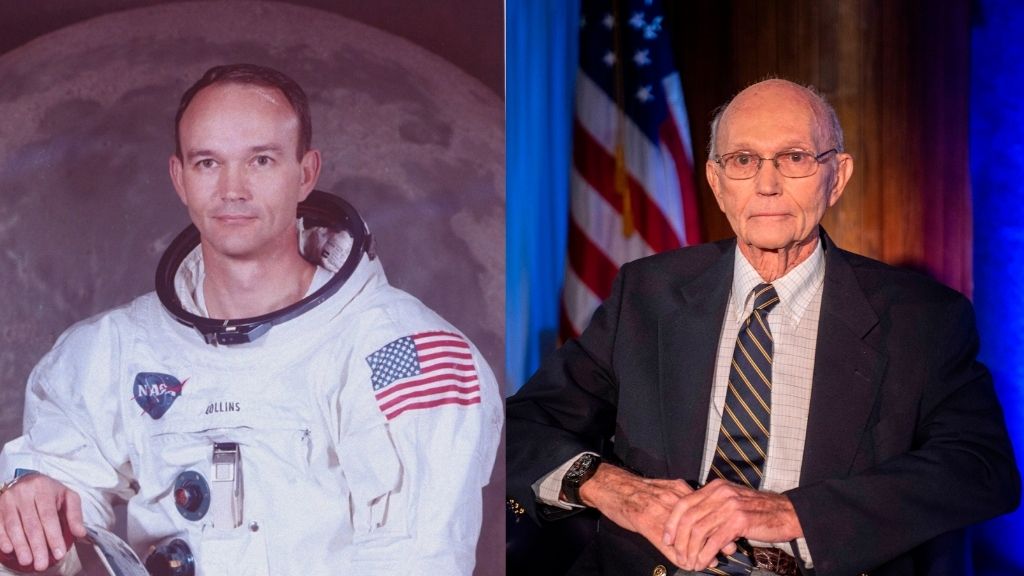Michael Collins, Apollo 11 pilot, dies at age 90

Michael Collins, the Apollo 11 command module pilot and first astronaut to orbit the far side of the moon alone, has died at age 90 of cancer.
"Today the nation lost a true pioneer and lifelong advocate for exploration in astronaut Michael Collins," NASA Administrator Steve Jurczyk said in a statement published Wednesday (April 28). "As pilot of the Apollo 11 command module — some called him 'the loneliest man in history' — while his colleagues walked on the moon for the first time, he helped our nation achieve a defining milestone."
On that famous mission, Collins worked alone in the command module "Columbia" for 21.5 hours, during which time the module drifted behind the moon, Space.com previously reported. In the last moments before he temporarily lost contact with Mission Control, he wrote, "I am alone now, truly alone, and absolutely isolated from any known life. I am it. If a count were taken, the score would be 3 billion plus two over on the other side of the moon, and one plus God knows what on this side."
Hence, Collins earned the nickname "loneliest man in history;" he's also been called the "forgotten astronaut," since he was on the Apollo 11 mission but never walked on the moon as Neil Armstrong and Buzz Aldrin did that day, NPR reported.
Related: Alone at the Moon: What Was Michael Collins Thinking During the Apollo 11 Lunar Landing?
"It's a shame that when people are asked, 'Can you name the Apollo 11 crew.' Mike Collins is normally the name that doesn't come to mind," Francis French of the San Diego Air and Space Museum and author of many books on the space program, told NPR. "He was the one who really knew how to fly the spacecraft solo (the only person who flew a spacecraft solo in the entire mission) and the only one who could get all three of them home."
In later interviews about the mission, Collins said he didn't actually feel lonely while passing behind the moon, Space.com reported.
Sign up for the Live Science daily newsletter now
Get the world’s most fascinating discoveries delivered straight to your inbox.
"Behind the moon it was very peaceful — no one in Mission Control is yakkin' at me and wanting me to do this, that, and the other. So I was very happy, it was a happy home," he said at an Explorer's Club event in 2019. That said, during the pass, Collins did worry about the small colony of white mice they'd brought along on the mission, he confessed. The crew would quarantine with the mice when they returned to Earth, to see if the rodents developed any strange illnesses during the trip.
Before his second and last mission to space on Apollo 11, Collins served as a pilot on Gemini 10, the 16th crewed spacecraft to circle Earth, according to Space.com. He also played important roles at Mission Control on other missions, communicating with astronauts aboard Apollo 8, for instance.
After clocking more than 266 hours in space, Collins left NASA in 1970 and became director of the National Air & Space Museum in Washington, D.C., where he worked for eight years.
Regarding Collins' passing, his family said "He spent his final days peacefully, with his family by his side," according to the NASA statement. "Please join us in fondly and joyfully remembering his sharp wit, his quiet sense of purpose, and his wise perspective, gained both from looking back at Earth from the vantage of space and gazing across calm waters from the deck of his fishing boat," they wrote.
Originally published on Live Science.

Nicoletta Lanese is the health channel editor at Live Science and was previously a news editor and staff writer at the site. She holds a graduate certificate in science communication from UC Santa Cruz and degrees in neuroscience and dance from the University of Florida. Her work has appeared in The Scientist, Science News, the Mercury News, Mongabay and Stanford Medicine Magazine, among other outlets. Based in NYC, she also remains heavily involved in dance and performs in local choreographers' work.










